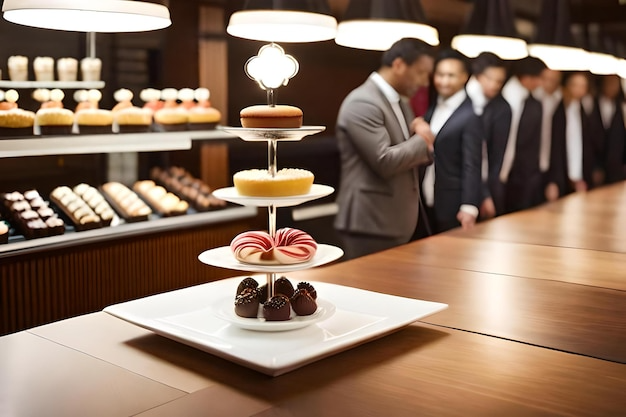
Corporate catering plays a pivotal role in business settings, enhancing events ranging from small meetings to large conferences.
It’s not just about providing food; it’s a reflection of a company’s hospitality and attention to detail.
Tailored catering solutions are crucial to accommodate the diverse needs and preferences of attendees, ensuring everyone feels valued and included.
Customized catering can cater to dietary restrictions, reflect a company’s ethos, and adapt to the specific tone and requirements of various business events.
This adaptability is essential in creating a positive and productive environment.
Understanding Your Corporate Catering Needs
To understand your corporate catering needs, start by assessing the specifics of your event.
Consider the size of the event – the number of attendees greatly influences the amount and type of food required.
The duration of the event is also crucial; a day-long seminar might need multiple meals and snacks, whereas a short meeting may only require light refreshments.
Additionally, understand your attendees’ preferences and dietary requirements.
This includes catering to common dietary restrictions (like vegetarian, vegan, or gluten-free options) and ensuring a variety of choices to suit different tastes.
Tailoring your catering to these aspects ensures a successful and inclusive event.
Exploring Catering Package Options
When exploring corporate catering package options, consider the type of event and its specific needs.
- Breakfast Catering: Ideal for early meetings. Options range from continental with pastries and coffee to full breakfasts with hot items.
- Lunch Catering: Includes sandwiches, salads, and hot buffets. Suitable for midday events, offering a balance of variety and convenience.
- Full-Day Catering: Covers all meals and snacks throughout the event, ensuring variety and sustenance for attendees during longer engagements.
- Specialty and Themed Catering: Tailored for specific events, matching themes or corporate branding.
The right package depends on the event’s duration, attendee preferences, and the overall tone you wish to set.
It’s essential to balance quality, variety, and practicality in your choice.
Customization is Key
Customization in corporate catering is essential for meeting the diverse needs and preferences of attendees.
It involves more than just selecting a menu; it’s about creating a dining experience that aligns with the event’s theme, the company’s brand, and the dietary needs of the participants.
Customized catering considers factors like cultural cuisines, special dietary requirements, and even the presentation style to enhance the overall event experience.
Effective communication with the catering service is key, allowing you to tailor the menu to fit the specific requirements and expectations of your corporate event.
This approach not only caters to the taste buds but also demonstrates attentiveness and inclusivity, contributing significantly to the success of the event.
Quality and Presentation
In corporate settings, the quality and presentation of food significantly impact the overall event experience.
High-quality food reflects well on your company’s standards and commitment to excellence.
Similarly, presentation plays a crucial role – well-presented food enhances the perceived value and professionalism of the event.
To ensure your caterer meets these standards, research their reputation and reviews, request tastings, and discuss presentation styles in advance.
Clear communication about your expectations and their capabilities is key.
Remember, the dining experience at your corporate event is a direct representation of your company’s brand and attention to detail.
Logistics and Planning
Effective logistics and planning are the backbone of successful corporate catering. This process involves several key steps:
Early Coordination:
Begin by coordinating with the caterer well in advance.
This allows time to finalize the menu, understand the venue’s facilities, and plan for the number of attendees.
Understanding the Venue:
It’s crucial to understand the layout and facilities of your venue. Determine where food will be prepared, served, and consumed.
Also, ensure there is adequate space for catering staff to work efficiently.
Aligning Catering with the Event Schedule:
The catering schedule should complement the event’s agenda.
Plan meal and snack times around the event’s key activities to avoid disruptions.
Clear Communication:
Maintain open and regular communication with your catering provider.
This ensures they are aware of any changes or specific requirements as your event approaches.
Contingency Planning:
Always have a backup plan. This could involve having additional food on standby, alternative menu options for last-minute dietary requirements, or plans for unexpected delays.
Attention to Detail:
Pay attention to the small details. This includes considering how food will be presented, ensuring there is a variety of options, and accommodating special dietary needs.
Feedback and Review:
After the event, gather feedback about the catering from attendees. This can provide valuable insights for future events.
By focusing on these areas, you can ensure that the catering at your corporate event runs smoothly, enhances the experience of attendees, and reflects positively on your organization.
Case Studies
Including real-life examples can effectively demonstrate the significance and impact of exceptional catering services.
These examples can range from showcasing innovative solutions in challenging scenarios to highlighting the successful integration of specific themes or dietary considerations.
They serve as tangible illustrations of how catering excellence can contribute to the overall success of corporate events.
Tech Conference Catering Success:
A case study of a tech conference where the catering company provided a variety of global cuisine options, reflecting the diverse backgrounds of the attendees.
This approach not only catered to different dietary needs but also enhanced networking opportunities as attendees bonded over unique food experiences.
Eco-friendly Catering at a Corporate Retreat:
An example of a company retreat where the caterer focused on locally sourced and sustainable food options.
This aligned with the company’s commitment to sustainability, impressing clients and employees alike.
Last-Minute Catering Turnaround:
A scenario where a corporate event planner faced a last-minute attendee surge.
The catering company successfully adjusted the menu and quantities, demonstrating flexibility and efficiency.
Each of these examples would highlight different aspects of successful corporate catering, from cultural sensitivity and environmental consciousness to adaptability under pressure.
Conclusion
The art of corporate catering extends beyond merely providing food; it plays a critical role in the success of business events.
Tailoring catering packages to meet the specific needs of an event, focusing on quality and presentation, and ensuring efficient logistics and planning are vital.
Each aspect, from understanding attendees’ preferences to adapting to logistical challenges, contributes to creating a memorable and seamless experience.
By emphasizing these elements, corporate catering can significantly enhance the atmosphere and effectiveness of any corporate event, leaving a lasting impression on attendees.





